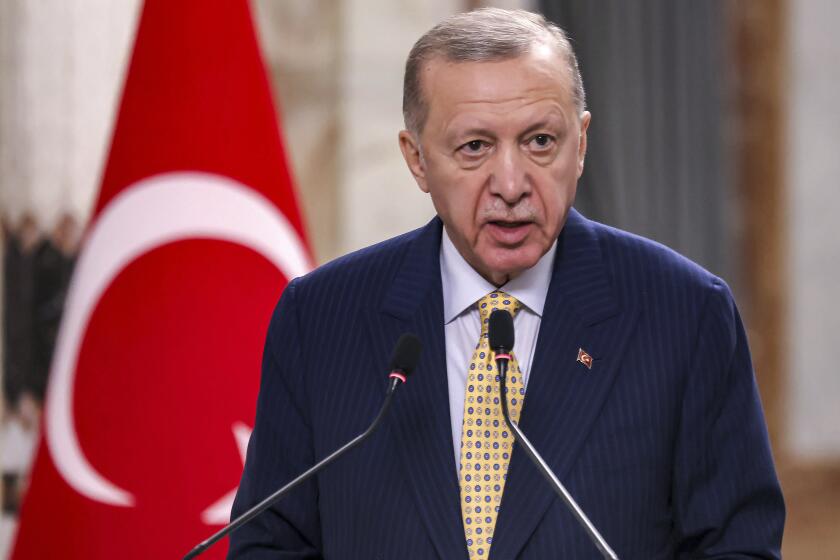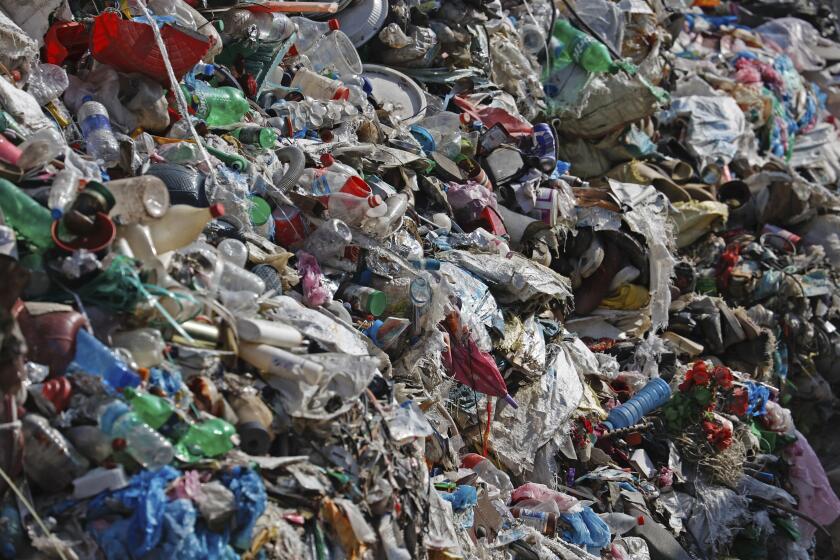48 arrested in U.S. raid on Mexican drug cartel
The Justice Department announced Wednesday that authorities had arrested more than 730 people across the country in a 21-month investigation targeting Mexico’s Sinaloa drug cartel and its infiltration into U.S. cities.
The arrests, including 50 on Wednesday in California, Minnesota, Maryland and the nation’s capital, come amid growing concern in Washington that Mexican crime organizations are out of control and threaten the stability of parts of Mexico and the safety of U.S. citizens.
The Homeland Security Department has developed a plan to send more agents and other resources, and possibly military support, to the U.S.-Mexico border if the drug violence continues to spill over and overwhelm the agents stationed there, a department official confirmed.
The Pentagon is looking into a larger role in bolstering counter-narcotics efforts. Adm. Dennis C. Blair, the director of national intelligence, told Congress on Wednesday that the corruptive influence and increasing violence of the cartels had undermined the Mexican government’s ability to govern parts of its country.
A recent State Department travel advisory warned U.S. citizens about the perils of travel in Mexico, likening the shootouts between authorities and the cartels to “small-unit combat.” The U.S. National Drug Intelligence Center believes that Mexican cartels maintain drug distribution networks or supply drugs to distributors in as many as 195 U.S. cities.
And on Wednesday, Rep. Lamar Smith (R-Texas), the ranking member of the House Judiciary Committee, said the recent surge in drug-related violence on the Southwest border “has turned some American communities and neighborhoods into the Wild West.”
“A battle is building on the border, and U.S. citizens are getting caught in the crossfire,” Smith said, calling on House Democrats to hold a hearing on drug-related violence on the border. “Congress must address the violence before more lives are lost.”
U.S. Atty. Gen. Eric H. Holder Jr., in his first news conference since taking over as the nation’s top law enforcement officer, offered this as proof of the creeping spread of the Sinaloa cartel in the United States: the seizure of more than $59 million in illegal drug proceeds and large amounts of narcotics, including more than 24,000 pounds of cocaine, 1,200 pounds of methamphetamine and 1.3 million ecstasy pills.
Authorities also seized more than $6.5 million in other assets, 149 vehicles, three aircraft, three maritime vessels and 169 weapons.
“The dimensions of what we are breaking up today had nationwide implications here” in the United States, Holder said.
Special Agent Michele Leonhart, acting administrator of the Drug Enforcement Administration, said the crackdown had denied at least $1 billion in drug revenue for the Sinaloa cartel, one of several syndicates fighting the Mexican government in a war that claimed the lives of more than 5,000 people in Mexico last year.
About 20 suspects have been arrested in Mexico as part of the crackdown, which has been coordinated by the DEA’s Special Operations Division in close cooperation with Mexico and dozens of local, state and federal law enforcement agencies in the United States.
Holder and top DEA officials said most, if not all, of the senior members of the cartel remained at large.
Mexican authorities Wednesday extradited the former leader of a separate cartel accused of smuggling tons of marijuana and cocaine into the United States during the 1980s and 1990s.
The suspect, Miguel Caro Quintero, headed the so-called Sonora cartel and faces federal drug-trafficking charges in Arizona and Colorado. He is the brother of Rafael Caro Quintero, a kingpin who was convicted and sentenced in Mexico for the 1985 killing of a U.S. drug agent, Enrique Camarena.
Holder said he had met with Mexican Atty. Gen. Eduardo Medina Mora on Tuesday to discuss how the two countries could cooperate to dismantle drug-trafficking organizations and root out corrupt government officials on both sides of the border.
“International drug-trafficking organizations pose a sustained, serious threat. They are national security threats,” Holder said. “They are lucrative, they are violent and they are operated with stunning planning and precision.”
Some federal law enforcement officials said the results of the investigation were being announced, at least in part, to address growing accusations that some senior elements of the Mexican government are aiding Sinaloa drug dealers or selectively going after competitors, allowing factions of the Sinaloa cartel to grow. Major corruption arrests in Mexico recently showed that a Sinaloa faction had paid senior officials in the Mexican attorney general’s office to notify it about impending enforcement actions.
A senior DEA official said top Mexican authorities were working closely with Washington to assess the damage from potential leaks from law enforcement officials, and to prevent them from happening.
Holder said the crackdown was considered one of the biggest binational successes against the Mexican cartels, but acknowledged that “this problem is one that will continue. This is an ongoing effort.”
The investigation started with the arrests of some alleged Sinaloa cartel members in California’s Imperial Valley and snowballed into as many as 160 inquiries in the U.S., Mexico and Canada, one senior DEA Special Operations official said.
One of its initial successes was the indictment of Victor Emilio Cazarez-Salazar, believed to be a leader in the Sinaloa cartel, DEA officials said. Cazarez-Salazar remains at large.
Holder and other officials said Wednesday that the Sinaloa cartel was responsible for bringing tons of cocaine, methamphetamine and marijuana into the United States through a sophisticated network of distribution and logistics cells in the country. It is also laundering millions of dollars in criminal proceeds, they said.
Those indicted in the cases have been charged with a variety of crimes, including engaging in a continuing criminal enterprise by violating various felony provisions of the federal Controlled Substances Act; conspiracy to import controlled substances; money laundering; and possession of an unregistered firearm.
Many of those in the United States were low-level operatives; some were illegal immigrants. At least several mid-level managers were believe to be in direct contact with leaders in Sinaloa, who also have been arrested, said the senior DEA Special Operations official, who spoke on condition of anonymity because the investigation is ongoing.
Thomas A. Schweich, deputy assistant secretary of State for international law enforcement in the Bush administration, said he saw good news and bad news in the Justice Department’s announcement.
“The bad news is that it shows that the cartels are everywhere, they are dangerous, and they are trafficking in everything,” he said. “The good news is that it shows that there are now cooperative, cross-border efforts to fight them. The cartels know no borders in what they do, and it is important that we know no borders in order to defeat them.”
--
Times staff writer Ken Ellingwood in Mexico City contributed to this report.
--
By the numbers
A 21-month probe resulted in at least 730 arrests and seizure of the following:
* $59 million in U.S. currency
* 24,000 pounds of cocaine
* 16,000 pounds of marijuana
* 1,200 pounds of methamphetamine
* 18 pounds of heroin
* 1.3 million ecstasy pills
* 265 pounds of MDMA (ecstasy) powder
* $6.5 million in other assets
* 149 vehicles
* 3 aircraft
* 3 maritime vessels
* 169 weapons
Source: Justice Department
More to Read
Sign up for Essential California
The most important California stories and recommendations in your inbox every morning.
You may occasionally receive promotional content from the Los Angeles Times.









